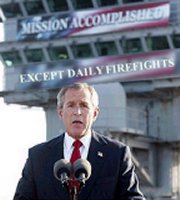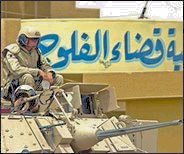Tuesday, May 27, 2003

According to an Associated Press report on the Washington Post site:
Gunmen opened fire on American troops at a checkpoint early Tuesday, killing two U.S. soldiers and wounding nine others in the troubled town of Fallujah - a hotbed of support for Saddam Hussein's fallen Baath Party, the U.S. military said. U.S. troops returned fire, killing two attackers and capturing six Iraqis for questioning. Hours later, two American military police officers were injured, at least one seriously, after two attacks with rocket-propelled grenades on a northwest Baghdad police station, said Lt. Clint Mundinger of the U.S. Army's 709th Military Police Battalion. In the past three days, seven American soldiers have died in attacks or accidents in Iraq.

US Troops in Falluja after attack
The story about this firefight, available on the troubled New York Times’ website, rapidly shifts from battle and dead soldiers to the telegenically upbeat Paul Bremmer:
Against the background of continuing violence, the head of the occupation authority in Iraq, L. Paul Bremer III, said on Monday that the Central Bank of Iraq and a group of private banks would begin providing "substantial" trade credits for exports to Iraq within weeks. Now that the United Nations has lifted sanctions on Iraq, and as the country resumes selling its crude oil in coming weeks, Mr. Bremer said the trade credit system would "lubricate international trade with Iraq" and would also serve to demonstrate symbolically "to the world that Iraq is open for business again."
The report goes on to matter-of-factly state that the “vault” under the Iraq National Bank has been opened:
One good economic omen for Iraq, Mr. Bremer announced, was the discovery of $250 million in salvageable American currency in the flooded basement vault of the Iraqi Central Bank. In the last few days, American crews drained river water from the damaged building and opened the vault to find the currency.
Reports following the looting of the Iraqi National Museum and statements by various US officials have indicated that the Museum’s gold trove was stored in vaults under the Iraq National Bank but there was no mention of missing antiquities in Mr. Bremmer's all business focus.
Photos: The Associated Press

